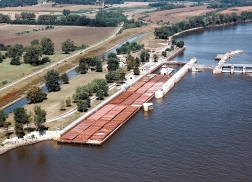The Senate has approved a long-delayed bill that authorizes an estimated $13 billion for Corps of Engineers water projects, but, in a big win for environmental groups, lawmakers added a provision that would subject large, controversial Corps projects to reviews from outside officials.
 |
| Bill authorizes funds for new Midwest river locks, including Lock #20 on the Mississippi, at Canton, Mo. (Photo courtesy of U.S. Army Corps of Engineers) |
The next step is a conference with the House, which passed a $12-billion bill in July 2005. If the legislation, the latest in a series of Water Resources Development Acts, is signed into law, it would be the first such bill enacted since December 2000.
The largest item in the measure, approved July 19 on a voice vote, is a $3.8-billion package of projects for the upper Mississippi River and Illinois Waterway. That includes $1.8 billion for seven new, 1,200-foot-long locks on the rivers and $1.6 billion for a variety of environmental restoration work.
Passage of the bill wasn't in doubt. The main drama centered on dueling amendments that would require more stringent reviews of Corps projects.
Environmental and spending-watchdog groups lobbied for a proposal from Sens. Russell Feingold (D-Wisc.) and John McCain (R-Ariz.) that would mandate reviews by outside "peers" of projects whose cost exceeds $40 million.
McCain said, "The record of the Corps of Engineers cries out for independent review and scrutiny...."
Environment and Public Works Committee Chairman James Inhofe (R-Okla.) and Sen.Christopher Bond (R-Mo.), with backing from industry and agricultural groups and labor unions, opposed the Feingold-McCain plan and offered an alternative that would set the threshold for reviews at projects whose cost tops $100 million. Bond contended that the Feingold-McCain proposal "has a tremendous potential to delay project construction."
Lawmakers sided with Feingold and McCain, approving their amendment by a 54-46 vote. In a follow-up vote, the Inhofe-Bond plan was defeated, 51-49.
After the Feingold-McCain proposal passed, Bond told ENR he was disappointed at the outcome, calling the amendment "a step in the wrong direction."
Later the Senate roundly defeated another Feingold-McCain rider, which would have required an annual list of Corps projects ranked in order of priority.
The fight about Corps project reviews is far from over. The issue is likely to be one of the toughest in the conference with the House, whose bill doesn't include a provision like the Feingold-McCain proposal.
Besides the long list of projects and the review requirements, the Senate's WRDA would establish a "national levee safety program," which would mandate an inventory of the country's levees and an assessment of their condition.




Post a comment to this article
Report Abusive Comment